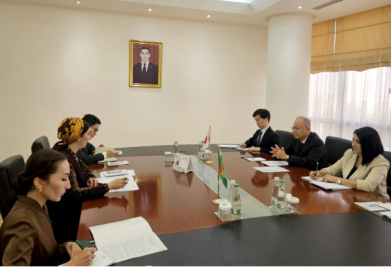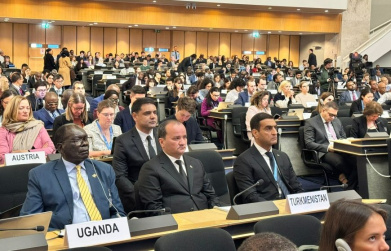A view on the geopolitical landscape of Central Asia through the prism of the Dushanbe expert forum
07.09.2024 | 07:55 |Recently, another meeting of scientists and experts dedicated to security in Central Asia took place in the capital of Tajikistan. In the modern world, numerous problems of state, societal, and individual security are far from being abstract concepts but are everyday challenges faced by millions and millions of people.
The security of Central Asia is also an acute issue, as evidenced by the regular holding of international forums on this and related topics. The Dushanbe meeting has taken a certain place in the series of these events.
The security of the state, as many believe, depends on the level of protection from terrorism, extremism, geopolitical rivalry, but the problem (whether we realize it or not) is complex, and it is also closely linked to other global processes, such as climate change, technological revolutions, which produce methods and means for cyber attacks and other types of information risks. And this problem needs to be addressed comprehensively. Whereas the focus of expert meetings used to be on combating individual challenges, now more attention is being paid to attempts to comprehensively form a long-term security architecture.
Experts gathered in the capital of Tajikistan spent a full day discussing ways to make the Central Asian region more stable and secure, examining these issues from two perspectives: political and security, as well as environmental and economic.
They discussed a wide range of issues, from combating terrorism to the joint use of natural resources, from issues requiring immediate decision-making to long-term programs without which it is difficult to achieve sustainable development. Such an approach allowed participants in this and a number of previous forums to analyze existing challenges as well as foreseeable risks in order to identify ways to preventively neutralize them.
During such conferences, particular emphasis is placed on pressing global problems arising from drug trafficking, cross-border crime, and others, as well as on the challenges of energy security and water resource management, which is extremely important given the region's natural and climatic specifics.
Various terms and phrases, including the concepts of "security zone" and "cooperation," are increasingly used in the context of the Central Asian agenda, reflecting the states' desire to create a space free, on the one hand, from external interference and internal conflicts, and on the other hand, to form an atmosphere of good-neighborly dialogue.
The President of the National Academy of Sciences of Tajikistan, Professor Kobiljon Khushvakhtzoda, noting that strengthening cooperation between the countries of the region is a key factor in successfully countering modern threats, immediately set the right tone, corresponding to the topic of the experts meeting.
During the discussion, the participants of the Dushanbe forum once again agreed on an axiomatic statement according to which only through joint efforts can the countries of Central Asia effectively counteract not only regional but also global challenges.
And there is no political conceit in this, for stability (equally as instability) in one state directly affects the situation in neighboring states, and the security of Central Asia from challenges, given its geostrategic position, is one of the factors of security at the global level.
In the work of the forum, an important aspect of the discussion was the topic of water resource management, which is becoming increasingly relevant in the objective conditions of climate change.
For instance, Guzel Maitdinova, Doctor of Historical Sciences, Professor at the Russian-Tajik (Slavic) University, and Director of the Center for Geopolitical Studies, believes that the states located in the transboundary Amu Darya region "should start new regional negotiations in the format of Tajikistan, Uzbekistan, Turkmenistan, Afghanistan, including Kazakhstan to find new mutually acceptable solutions to water and border problems, paying attention to the existing legal framework for cooperation on the Amu Darya water problems".
The conference participants were unanimous in their opinion about the need to strengthen the cooperation of the special services of the countries of the region, as well as to develop joint programs to counter the radicalization of society, and first of all - youth.
One of the key topics of the forum was energy security. Experts noted that diversification of energy supply sources and the development of regional energy projects contribute to strengthening economic stability and reducing dependence on external influences. However, specialists, not limiting themselves to energy issues, considered economic integration as a whole as one of the driving forces in ensuring the security of countries and peoples.
Given that the successful resolution of security problems in Central Asia largely depends on external actors, the speeches consistently emphasized the need for the region's states to pursue a balanced policy aimed at strengthening partnerships with all interested parties.
In particular, Nargiza Umarova, a researcher at the Institute of Advanced International Studies of the University of World Economy and Diplomacy, noted that “the leadership of Uzbekistan perceives Afghanistan as a country of opportunities and, emphasizing its belonging to Central Asia, advocates for deep integration of Afghanistan into regional economic processes”.
Representatives of the Scientific Center for Strategic Studies of the Ministry of Foreign Affairs of Turkmenistan, Dovletmyrat Mamedov and Orazmuhamet Annabayev, voiced a number of proposals based on the initiatives put forward by the President Serdar Berdimuhamedov at the fifth and sixth Consultative Meetings of the Heads of Central Asian States.
Thus, the expert forum in Dushanbe demonstrated that the countries of Central Asia fully realize the importance of precisely collective efforts in the comprehensive protection of their states.
The International Conference “Ensuring Regional Security in Central Asia in Modern Conditions” was organized by the Institute of Asian and European Studies of Academy of Sciences of Tajikistan with the assistance of the Konrad Adenauer Foundation and the National Foundation “Silk Road - the Path of Consolidation”.
The Konrad Adenauer Foundation's Regional Program plays a special role in strengthening security and cooperation in Central Asia. The Foundation actively supports projects in the areas of economic development, democratization, youth policy, and civil society. These programs are aimed at forming an expert community, strengthening dialogue between representatives of various political forces, promoting the development of civil society, and so on.
It cannot be said that the conference held in Dushanbe was an event that reflected the evolution of the geopolitical situation in Central Asia, but it became a link in a series of similar events that confirms the continuity in decision-making towards a common goal for all states in the region, outlining trends in strengthening stability and sustainable development through well-coordinated interaction between countries.
However, everyone is well aware that to achieve long-term results, it is necessary not only to continue dialogue and strengthen trust, but also to take concrete steps to implement the decisions made.
Security is not merely the absence of armed conflicts and acts of international crime, but also ensuring economic growth and human development, strengthening the foundations of stability and social consensus. The rich natural resources, developing economy, human potential, and quantitative growth of the young population in the countries of Central Asia create favorable conditions for the prosperity of its peoples.
The recommendations voiced during the Dushanbe conference, which, once summarized, will be transmitted to the governments of the Central Asian states, demonstrate solidarity in the striving for close integration and the creation of a common territory of security and cooperation in Central Asia.
The expert meetings and forums will continue until the region reaches a level of agreement that will allow the sovereign states of Central Asia to act at the national level and on the international arena from the most unified positions possible.
Бекдурды АМАНСАРЫЕВ











